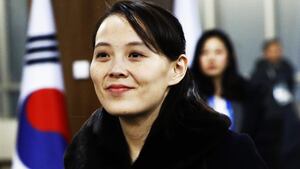The North Korean state media triumphantly published a congratulatory message from the queen on Monday prompting knowledgeable insiders to speculate that Pyongyang must have made up the note from Buckingham Palace in a propaganda move to shore up the rogue state’s international standing.
A royal spokesman, however, has confirmed to The Daily Beast that Queen Elizabeth II did indeed send a cheery message to Kim Jong Un on the occasion of the 73rd anniversary of the founding of the Democratic People’s Republic of Korea.
North Korea “regularly greets our queen on her birthday,” Korea expert Aidan Foster-Carter, senior research fellow at Leeds University in England, told The Daily Beast, “but I find no trace of any message from us/her to them—until now. So this is intriguing.”
The message, dated September 7, two days before North Korea’s founding day parade, was revealed Monday by Pyongyang’s Korean Central News Agency, which published it in its entirety among dozens of other messages from leaders of countries such as Algeria, the Seychelles, and Azerbaijan. The controversial King of Thailand was another well-wisher, but the heads of other major Western powers were notable by their absence.
The queen avoided any personal tribute to the Korean dictator despite hailing the anniversary of the establishment of the Kim dynasty.
“As the people of the Democratic People’s Republic of Korea celebrate their National Day, I send my good wishes for the future,” she said.
A royal spokesperson confirmed the authenticity of the message to The Daily Beast, dispelling suspicions that it might have been an elaborate hoax. The palace would only say that the message had been sent to the head of state, although there is only one man to whom that could refer. Pyongyang’s KCNA confirmed it was sent to Kim Jong Un as “president of state affairs.”
“It was a message sent by the Foreign and Commonwealth Office (FCDO) on behalf of Her Majesty to the people of North Korea on their national day,” said a spokesperson for the palace. Such messages are routinely sent in the queen’s name by and on the advice of the FCDO, she would not have crafted the message herself.
However, efforts to downplay the significance of the message will not appease critics who fear the regime is making use of the queen’s message to confer legitimacy on its autocratic system. North Korea’s nuclear aspirations were demonstrated again on Sunday with boasts of successful tests of a new long-range cruise missile.
DPRK leaders have been trying to engage with the queen for years, sending nice notes to the family and her citizens. In 2014, for instance, Kim Yong Nam, then North Korea’s titular head of state, sent birthday greetings to the queen in which he wished her and her subjects “health and happiness... well being and prosperity.”
The sense then, as now, was that North Korea was reaching out for friendship with the U.K. despite hostility dating to the Korean War when British troops played heroic roles under the aegis of the United Nations Command in battles along the line between the North and South.
Bruce Bennett, North Korea expert at the Rand Corporation, said the queen’s message could also be seen as pro-Western propaganda, designed to appeal to the people of North Korea rather than the ruling family.
“I firmly believe that the ROK (South Korea, the Republic of Korea), the U.S. and other allies should be telling the people of North Korea that we do not hate them. Contrary to what the regime tells them, we are not their enemies, and that we really hope that they can have a better life.”
Bennett suggested that the U.S. should follow the queen’s example when it came to congratulating the North Koreans on anniversaries.
“I have always been puzzled with why the U.S. government doesn’t try to send such messages,” he said. While Kim Jong Un “appears to be paranoid about outside information, the U.S. and its allies should be regularly sending appropriate messages to the people of North Korea, messages that contradict the regime’s villainizing propaganda.”
“With Kim having so many internal problems right now, he needs scapegoats to blame,” said Bennett. “What better message to send that that we are not hurting North Korea—the regime is.”
Andrew Salmon, an author of ground-breaking books on the Brits in the Korean War, saw the leaders of the two countries in a symbiotic relationship. Those few words from the queen, he said, were “a message from one hereditary (constitutional) monarch to one hereditary (absolute) monarch.”
But there may be more to the message than mere words, in the view of Choi Jin-wook, who’s been analyzing North Korea issues for decades with the Korea Institute of National Unification and others.
“A wild guess!” he said, observing that the U.S. and U.K. “are in intimate communication” and may have collaborated on the message. “A country or a person like North Korea which is isolated and labeled a usual suspect needs to be treated nicely. Otherwise, it may make trouble,” he said.
Choi said the U.S. was in no position to “do anything,” but interestingly the top U.S. negotiator on the DPRK, Sung Kim, was in Tokyo conferring with South Korean and Japanese envoys even as KCNA was reporting the message. Sung Kim’s point was the U.S. wanted to get into a dialogue with the North “regardless of progress on denuclearization,” according to Yonhap, the South Korean news agency.
Indeed, Sung Kim talked up negotiations despite North Korea boasting of having successfully test-fired a new type of cruise missile over the weekend. Without referring to the cruise missile tests, he said the U.S. was “prepared to work cooperatively with the DPRK to address humanitarian concerns,” Yonhap reported.
Shim Jae-hoon, a long-time analyst of Korean issues, had a less charitable explanation for the royal gesture. “Think of her age (95),” he said. “She may just be getting on.”




